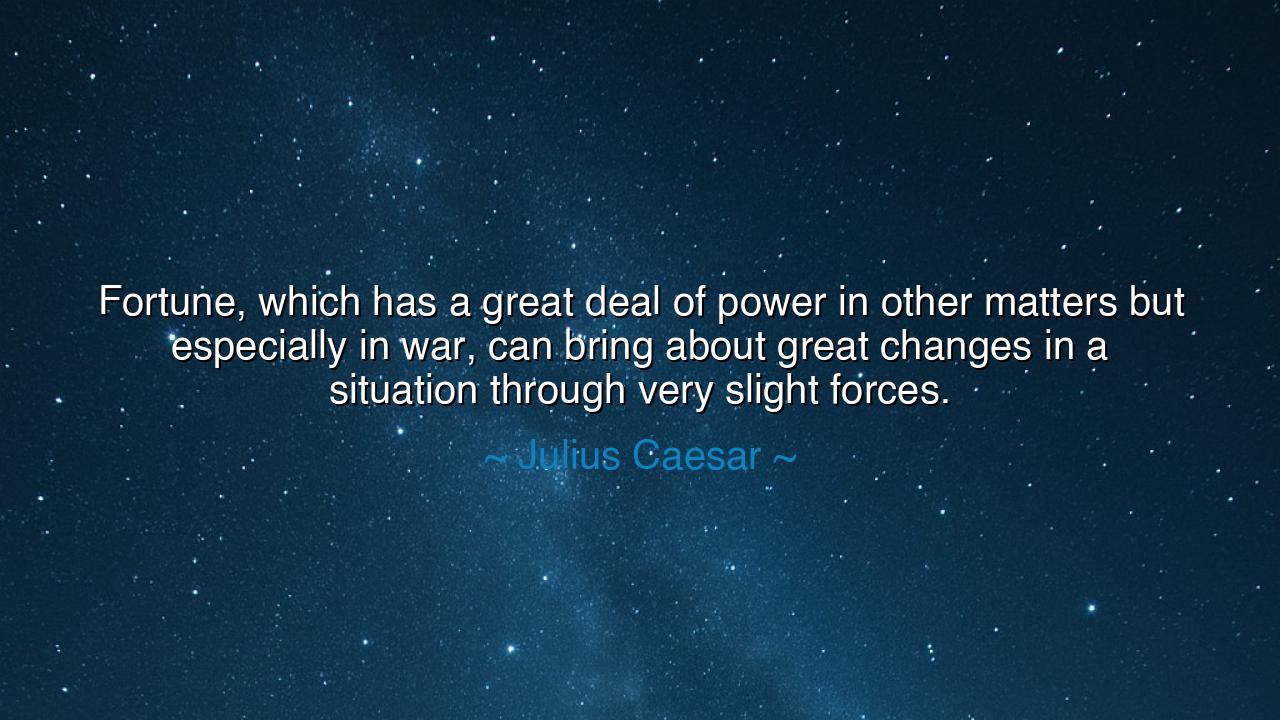
Fortune, which has a great deal of power in other matters but
Fortune, which has a great deal of power in other matters but especially in war, can bring about great changes in a situation through very slight forces.






In the immortal words of Julius Caesar, conqueror, statesman, and chronicler of destiny, we hear this timeless reflection: “Fortune, which has a great deal of power in other matters but especially in war, can bring about great changes in a situation through very slight forces.” These words are not the boast of a general who trusted only in strength, but the confession of one who had seen how fragile even the mightiest plans can be. For Caesar, who commanded legions and bent empires to his will, knew that victory often hangs not on numbers or strategy alone, but upon the unseen hand of Fortune—that mysterious tide of chance and circumstance which can lift a man to glory or hurl him into ruin in the blink of an eye.
The origin of this saying comes from Caesar’s own writings, the Commentarii de Bello Civili and de Bello Gallico, where he recorded the trials of his campaigns with both clarity and restraint. In these chronicles, he does not speak merely as a warrior, but as a philosopher of power. He had seen too many battles turn on a gust of wind, too many empires tremble from a single act, to believe that human mastery was absolute. Thus, he acknowledged Fortune—that ancient goddess whom the Romans both revered and feared—as a force ever present in the theater of life, especially in war. The soldier may plan his march, but the rain may drown his advance; the general may build his camp, but one deserter’s whisper can turn victory into retreat.
The ancients personified Fortune as a goddess with a wheel, forever turning—raising kings one moment, casting them down the next. Caesar, though a man of supreme confidence, understood the truth of that symbol. He had felt her favor when his army crossed the Rubicon and destiny bent in his favor, and he had seen her turn when daggers were drawn against him in the Senate. His words remind us that all human power stands upon shifting ground. The smallest cause—a word, a spark, a moment of hesitation—can alter the course of history.
Consider, for example, the fateful battle of Waterloo, centuries after Caesar’s time. Napoleon Bonaparte, another master of men, faced the armies of Europe with brilliance and experience. Yet Fortune betrayed him through a sudden rainstorm. The heavy mud delayed his cannon, his horses struggled in the mire, and hours were lost. Those few hours gave the Prussians time to arrive, and by nightfall, the emperor’s empire lay in ruins. Thus did a few inches of rain—those “very slight forces” of Caesar’s words—decide the fate of nations. So too, in every age, the proud are reminded that the world turns not by their command alone.
But Caesar’s wisdom does not teach despair—it teaches humility and vigilance. To recognize the power of Fortune is not to surrender to it, but to respect it. The wise do not curse the storm; they prepare for its coming. The general who understands that chance governs war plans not only for victory, but for change. Likewise, in life, the one who acknowledges uncertainty learns flexibility, patience, and grace. When Fortune’s wheel turns against them, they do not crumble—they adapt, they endure, and they wait for the turn that will lift them again.
There is also, within Caesar’s words, a reminder of the sacred balance between human effort and divine mystery. For while Fortune may sway the outcome, it is still the will of men that dares the battle. The gods may control the wind, but the sailor still must raise his sail. Greatness lies not in controlling Fortune, but in standing firm before her, in striving with courage even when the outcome is unsure. Caesar himself, though he spoke of Fortune’s power, never ceased to act boldly. He knew that courage invites her favor, while fear guarantees defeat.
The lesson, then, is this: be strong in purpose, yet humble in outcome. Work with all your might, but never forget that life is a field where both skill and chance play their parts. Do not boast of success, for Fortune may have lent her hand; do not despair in failure, for she may yet return. In every endeavor—whether in battle, in labor, or in love—remember that small things, often unseen, can change the world. A word of kindness, a moment of courage, a single act of faith—these are the “slight forces” that can turn the tide of human fate.
So, my listener, walk with the wisdom of Caesar: act as though all depends on your will, but pray as though all depends on Fortune. For life is not a contest of mastery, but a dance between effort and destiny. Those who move with grace upon that turning wheel shall neither fear its fall nor be blinded by its height. And when change comes, as it always does, they will stand steadfast—noble in triumph, and undaunted in loss—knowing that the greatness of mankind lies not in controlling Fortune, but in how we face her.






AAdministratorAdministrator
Welcome, honored guests. Please leave a comment, we will respond soon